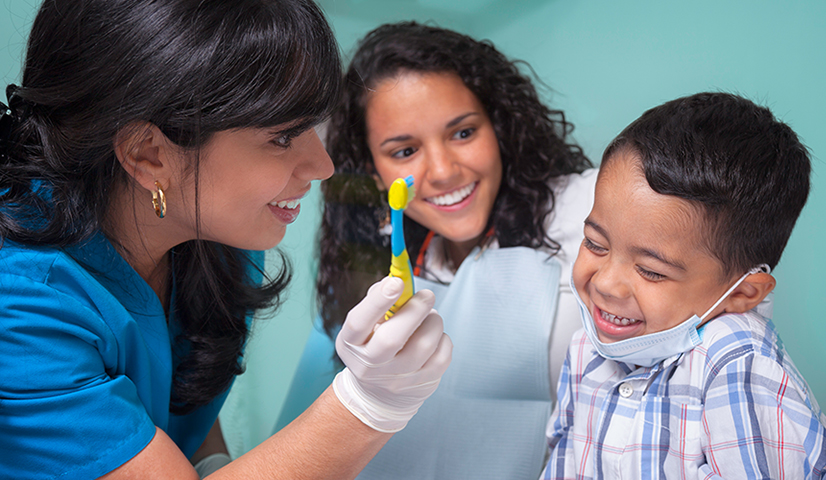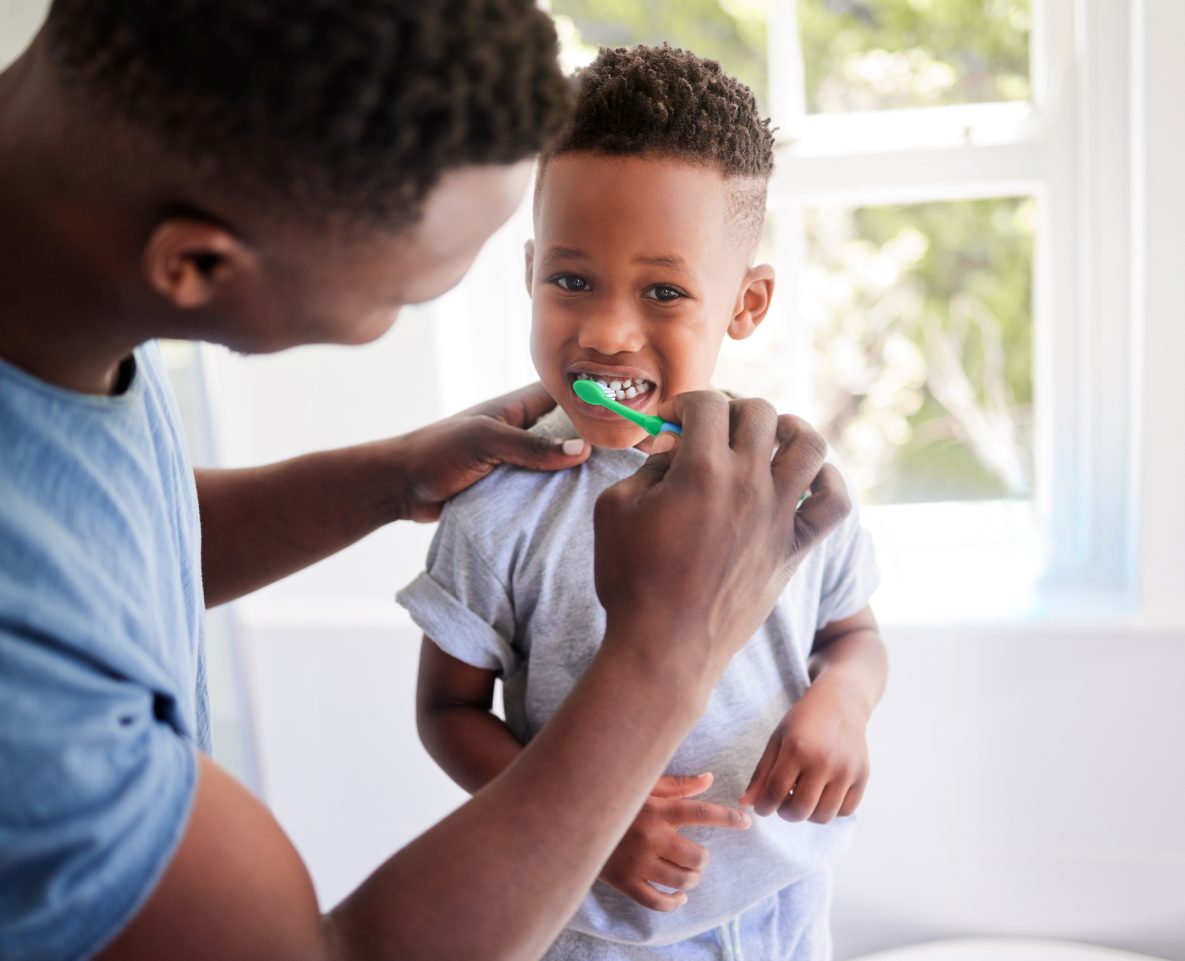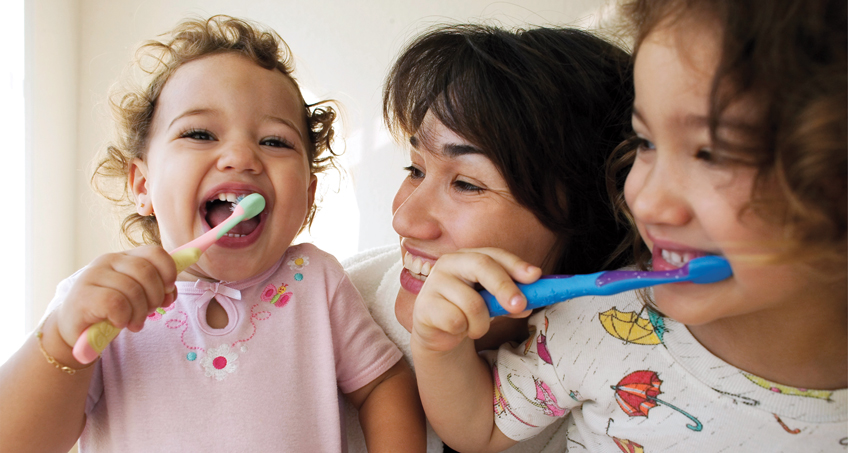In both children and adults, building good dental hygiene habits is essential for overall health and well-being. Though your child’s 20 primary teeth (also known as “baby teeth”) will eventually be replaced by permanent adult teeth, they still play a vital role in jaw and facial development. In addition to acting as placeholders for your child’s permanent teeth, primary teeth allow your child to speak and chew properly and support correct bite alignment.
Neglecting to care for your child’s baby teeth can lead to a number of dental problems, including tooth decay, gum disease, tooth loss, and even infection. Poor dental hygiene can also have long-term consequences for your child’s physical and emotional health. Children with dental problems may experience pain, discomfort, and difficulty eating, which can negatively impact their growth, nutritional status, and ability to learn. (Research shows that kids with poor oral health are three times more likely to miss school than their peers.) Dental problems can also affect your child’s self-image, reducing their confidence and interfering with normal social development.
As parents, it is crucial to establish healthy oral hygiene habits in your children from an early age. By doing so, you can help prevent dental problems and give your child the skills they need to maintain lifelong oral health. Below, we’ll share some tips for establishing an oral care routine at home and teaching your child how to care for their teeth correctly:
Tips for Building Good Dental Hygiene Habits
Teach Children Early
Children who learn to take care of their teeth and gums at a young age are more likely to maintain good oral health habits into adulthood. They are also less likely to develop dental caries (cavities), gum disease, and other dental problems.
Ideally, your child should start receiving oral care before their first tooth appears. Parents can begin by cleaning their baby’s gums with a soft cloth or a silicone finger brush. Once the first teeth come in, a soft-bristled toddler toothbrush and fluoride toothpaste can be introduced.
Routine dental exams also play a key role in establishing good oral health for babies and toddlers: According to the American Dental Association (ADA), your child should have their first dental visit by their first birthday or within six months of the first tooth erupting. Seeking dental care before the eruption of your child’s primary teeth allows your family dentist to examine your child’s mouth for potential problems caused by bad habits (such as excessive thumb-sucking), tooth crowding, misalignment, or other issues. The dentist will also teach you about proper dental care and hygiene, including brushing and flossing techniques, and establish a positive rapport with your baby. By making these early experiences fun for your child, your dentist will reduce the likelihood of them developing dental anxiety later on.

Choose the Right Oral Hygiene Tools
As children grow older, they should be taught to brush their teeth twice a day for two minutes and to floss daily. To ensure this process goes smoothly, be patient and select the right dental care products for your child’s age. Different age groups have different oral care needs, and using age-appropriate products can make a significant difference in how comfortable and confident your child feels when caring for their teeth.
For infants and toddlers, gentle toothbrushes with soft bristles are essential. Look for toothbrushes specifically designed for babies (sometimes called “training toothbrushes”) that have small heads and extra-soft bristles to protect their delicate gums. At this age, you may choose to use a fluoride-free toothpaste to minimize the risk of fluoride ingestion, but it’s important to talk to your dentist before deciding which product to use. If your child has an elevated risk of early tooth decay, your dentist may recommend using an infant-formulated fluoride toothpaste instead.

Around age three, you can transition your child from a baby toothbrush to a small-sized toothbrush with slightly firmer bristles. At this stage, introducing a pea-sized amount of fluoride toothpaste is recommended to prevent cavity formation. Remember to supervise your child’s brushing routine to ensure they are using the correct technique and not swallowing toothpaste, and look for ways to make oral care enjoyable.
Using brightly-coloured oral care products with fun shapes (e.g., toothbrushes that look like dinosaurs or animals) and fruit-flavoured toothpaste is a great way to prevent boredom and resistance in young children who are still getting used to brushing and flossing. You should also make sure to choose implements that are easy for your child to hold; toothbrushes should have firm grips sized for small hands, and you should opt for floss picks over traditional thread floss.
As your child reaches school age, consider upgrading to an electric toothbrush designed specifically for kids. Electric toothbrushes can provide more efficient cleaning by removing plaque effectively while making brushing easier and more engaging for children. At this age, you can also consider introducing new tools, such as water picks and interdental brushes, to augment your child’s oral care routine.
Remember that regular visits to the dentist are just as important as good home care in maintaining your child’s oral health as they grow and develop. Your dentist will be able to provide personalized recommendations based on your child’s specific needs and monitor their overall dental development, along with preventing and treating tooth decay.
Set a Good Example – And Be Consistent
Children learn primarily through imitating the adults around them. As such, parents must pay special attention to modelling good oral care habits: Maintain a consistent routine where you and your child brush your teeth for at least two minutes twice daily (and floss once daily) and schedule regular dental exams for yourself as well as your child. Studies show that parental attitudes have a strong influence on oral health in kids, so caring for your own teeth is a critical part of establishing good habits in your children.
Encourage a Healthy Diet
Another key factor in maintaining excellent oral health is eating a well-balanced diet that limits the consumption of sugary foods and beverages. Sugars can contribute to the growth of harmful bacteria in the mouth, leading to tooth decay and gum disease. Encourage your children to choose healthier alternatives by basing snacks and meals around fruits, vegetables, and whole grains. Not only are these options lower in sugar than many processed and packaged foods, but they’re also higher in natural fibre, which aids in plaque removal.
Incorporating calcium-rich foods into your child’s diet is also vital for strong teeth and bones. Milk, cheese, yogurt, and other dairy products are excellent sources of calcium that can help fortify their dental health. Dairy-free options like kale, broccoli, and bok choy, along with fortified tofu and plant-based foods and beverages, also provide substantial amounts of calcium.
Complement calcium-rich foods with foods rich in vitamin C (such as citrus fruits) and vitamin D (e.g., fatty fish). Vitamin C boosts the immune system and supports gum health, while Vitamin D aids in calcium absorption.
Lastly, promoting good hydration by encouraging kids to drink plenty of water throughout the day can also improve oral health. Water helps flush away food particles and stimulates saliva production, which prevents enamel erosion by neutralizing harmful acids produced by bacteria. (Bacteria in the mouth naturally convert sugar into lactic acid, which can gradually deplete tooth enamel.)
Get Creative with Dental Care
With guidance and the right tools, most kids quickly adjust to regular brushing and flossing. In some cases, however, extra encouragement is needed to help kids adopt good habits.
Along with choosing colourful, interesting oral care products, you can make brushing fun for your child by turning it into a game. Set a timer for two minutes and challenge your child to brush their teeth correctly for the entire duration (offer a reward, such as a sticker or piece of sugar-free candy, to reinforce your child’s enthusiasm). Other strategies you can use include:
- Let your child choose their toothbrush and toothpaste. Kids are more willing to participate in activities they feel they have some control over.
- While brushing, have your child count the number of teeth they have or see who can make the most bubbles with their toothpaste.
- Brush your teeth together as a family and play music (or sing a song) while brushing to make it more entertaining.

- Use an app to keep brushing fun. Multiple apps exist to help kids learn how to brush their teeth correctly and stay on track with oral care, such as the Wiggles app, Brusheez Little Monsters app, Aquafresh Brush Time app, etc. These apps allow kids to play fun songs or interact with familiar characters while brushing, adding a whole new dimension to the experience.
Find the Right Pediatric Dentist
To ensure your child’s early dental visits are beneficial and enjoyable, it’s essential to choose an experienced, patient, and compassionate pediatric dentist. A good pediatric dentist will both specialize in childhood tooth development and know how to make your child feel comfortable in the dental office, even if they’re shy or nervous.
Remember: Your child’s early dental visits will shape their perception of oral health and dental care. Knowing what to expect during your child’s first dental appointment and selecting the right family dentist creates the foundation for lifelong oral health and significantly reduces any anxiety your child will experience during future dental procedures.
Conclusion
As one of Mississauga’s leading pediatric dentists, Dr. Oscar Dalmao understands how to make oral hygiene fun and approachable for kids of all ages – and their parents. As part of our dental exams, we provide oral health education for the whole family, ensuring that parents have the skills and products they need to care for both their oral health and their children’s. It’s our mission to support families in developing excellent oral care habits so they can enjoy enhanced well-being and bright, beautiful smiles together.
Contact us today to schedule your child’s first dental appointment and experience the difference a good pediatric dentist can make.


